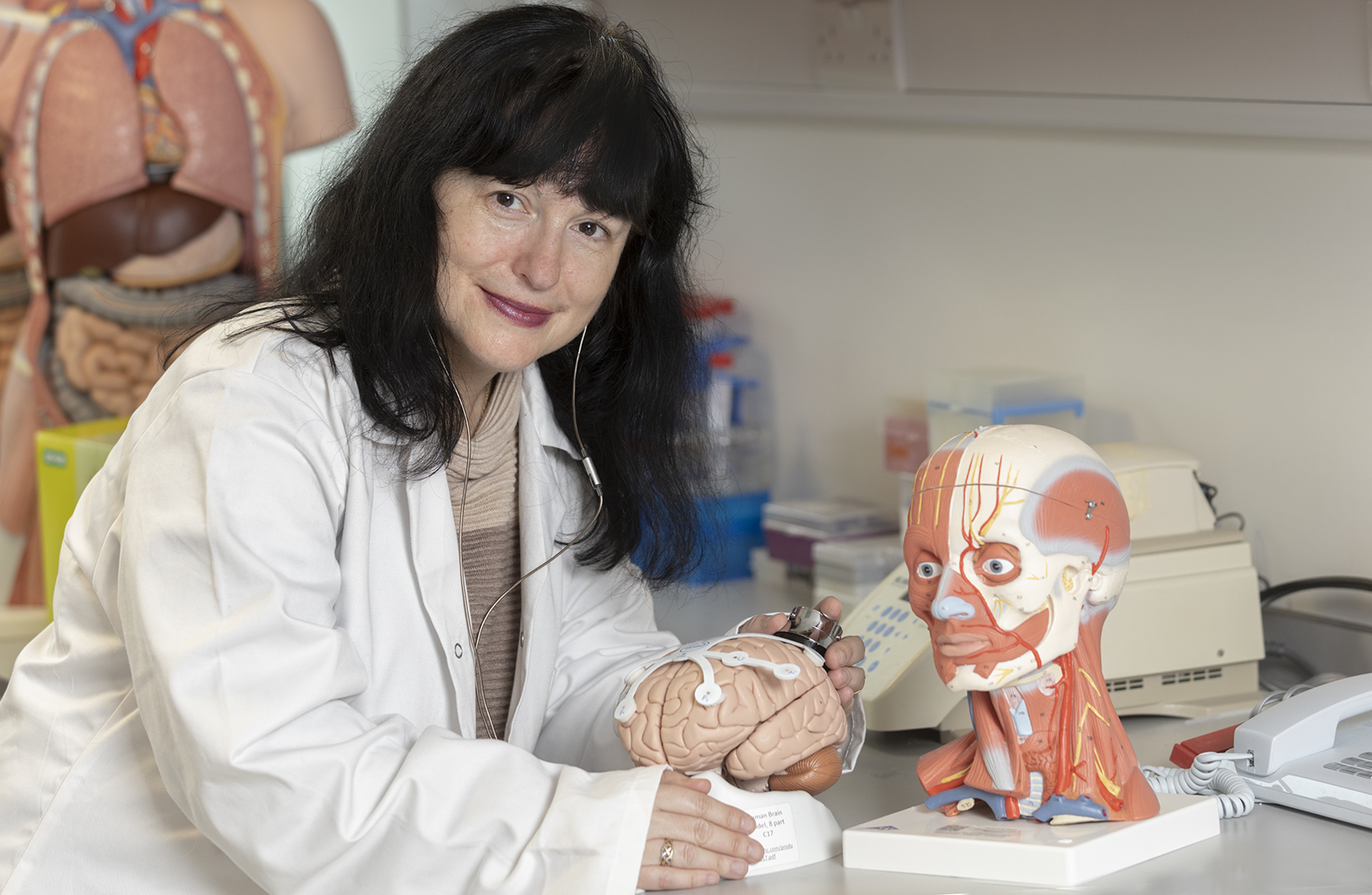In This Section
- Home
- Staff Profiles & Phone Book
- About the Department
- Welcome from Head of Department of Anatomy and Neuroscience
- A History of the Department
- A history of the Department; The early years to the 1980s
- A history of the Department; The move from the Windle Building to BSI and WGB
- UCC Professors of Anatomy and Heads of Department
- The development of the UCC HUB
- Current students, recent research graduates and awards
- Useful Links
- Study Anatomy
- Study Neuroscience
- Research
- Neural circuitry underlying Neuropsychiatric and Neurological Disorders 2026
- Neurogastroenterology 2026
- Developmental Neuroscience and Regeneration 2026
- Neurodegeneration 2026
- Neuroinflammation 2026
- Neuroprotection and Therapeutics 2026
- Neuroproteomics and Molecular Psychiatry 2026
- Anatomy Education Research 2026
- Research Facilities 2026
- Postgraduate Research Programmes 2026
- UCC Anatomical Donations
- Biosciences Imaging Centre
- BSc Medical and Health Sciences
- News & Events
- News Archive 2024
- News Archive 2023
- News Archive 2022
- News Archive 2021
- News Archive 2020
- News Archive 2019
- News Archive 2018
- News archive 2017
- News Archive 2016
- News Archive2015
- News Archive 2014
- News Archive 2013
- News Archive 2012
- News Archive 2011
- BRAIN AWARENESS WEEK 2023
- Department Events and Conferences
- Seminar series 2019_2020
- photo galleries
- Narrowing the void Conference 2023
- Photos of BSc Medical and Health Sciences Mentoring launch 2022
- International Women's Day 2023
- 2023 BRIGHT FUTURES - Celebrating our researchers
- 2023 UCC Futures - Future Ageing & Brain Sciences
- Recent Graduations July 2023
- Anatomy and Neuroscience Top 100 Anatomy Physiology 2023
- BRAIN AWARENESS WEEK 2023 FUN AND GAMES EVENT
- Medical and Health Sciences First year class 2023
- 2023 Brain Awareness week Scientific discussion photo gallery
- World Anatomy Day 2023
- BSc MHS MENTORING PROGRAMME 2023
- BSc Medical and Health Sciences Graduation 2023
- BSc Neuroscience Graduation Photo Gallery 2023
- Dr Kathy Quane Nov 2023
- THANKSGIVING PHOTOS 2012
- Photo Gallery: Society of Translational Medicine Careers Fair 2023
- Photo Gallery:2023 TRAIN AWARDS
- Photo Gallery:2024 Creative Week St Joseph's NS
- Photo Gallery: Department of Anatomy and Neuroscience Thanksgiving Service 2024
- Photo Gallery: Professor Aideen Sullivan farewell party
- Photo Gallery: Irish Pain Society Annual Scientific Meeting Cork 2023
- Photo Gallery: 2024 Medical and Health Sciences Graduation
- Photo Gallery: Medical and Health Sciences Meet and Greet 2024
- Photo Gallery: 2024 BSC NEUROSCIENCE Graduation
- Photo Gallery: 2025 INTERNATIONAL WOMEN'S DAY
- Photo Gallery: 2025 BSc Neuroscience class and staff
- Photo Gallery: 2025 BRAIN CONNECTIONS
- BSc Neuroscience Graduation Photo Gallery 2025
- World Anatomy Day 2025
- UCC Learning and Teaching Showcase 2025
- MSc Human Anatomy Graduation Photo Gallery 2025
- Narrowing the Void Conference 2023
- Department of Anatomy and Neuroscience Contact Us
Dr Andreea Factor and UCC interdisciplinary researchers discover revolutionary method of analysing newborn babies’ brainwaves

Dr Andreea Factor lecturer in the Department of Anatomy and Neuroscience in an interdisciplinary team with colleagues from the Department of Engineering UCC have developed an innovative stethoscope using artificial intelligence (AI) for the accurate detection of congenital heart disease in newborn babies.
The AI-assisted approach uses sound, rather than visual images, to analyse brainwaves (EEG monitoring) and is geared towards more universal healthcare in resource-constrained communities.
Dr Andreea Factor is the medical lead on the team, as a medical doctor, with extensive clinical experience in neurology and cardiology, Dr Factor worked to create algorithms that perform on par with real live medical professionals. A graduate of Medicine and Pharmacy University in Timisoara, Romania, Dr Factor also collaborated on the work with medical colleagues in Ukraine who supplied clinical data used in the study.
“A project close to our hearts”, says Dr Andreea Factor, lecturer in the Department of Anatomy and Neuroscience.
The concept of a stethoscope was also used to detect anomalies in the brain. Here anomalies manifest as seizures for neonates. This is a very challenging task due to a myriad of causes including diagnosis based on a very complex signal (Electroencephalogram or EEG), lack of availability of trained personnel, delay in analysis reports, cost, etc. All these lead to increased mortality and morbidity, with a prevalence in resource-constrained communities.
By using artificial intelligence-assisted sonification of brain waves, the difficult task of identifying seizures is translated into listening to some specific sound signatures. This new technique has great potential in making the detection of seizures more pervasive, with more medical professionals having access to a fast and accurate technique for seizure detection.
 UCC interdisciplinary research team: Professor Andriy Temko Electrical and Electronic Engineering, PhD student Sergi-Gomez Quintana Electrical and Electronic Engineering, Dr Andreea Factor Anatomy and Neuroscience, Dr Emanuel Popovici Electrical and Electronic Engineering. Photo Ralph O'Flaherty
UCC interdisciplinary research team: Professor Andriy Temko Electrical and Electronic Engineering, PhD student Sergi-Gomez Quintana Electrical and Electronic Engineering, Dr Andreea Factor Anatomy and Neuroscience, Dr Emanuel Popovici Electrical and Electronic Engineering. Photo Ralph O'Flaherty
This research was presented at the EAPS 2022 Congress in Barcelona and will appear in the Frontiers in Pediatrics Journal. The novel framework appeared also in a recent Nature Scientific Reports journal and is also a subject of ongoing collaboration.
Dr Andreea Factor is a College Lecturer in the Department of Anatomy and Neurosciences. She is a medical doctor, and a graduate of Medicine and Pharmacy University in Timisoara, Romania. She has an extensive clinical experience in neurology and cardiology. She holds also a master’s in science in Biochemistry from UCC. Currently, she teaches anatomy in several programs from Medicine/Radiology to Engineering. She also enjoys interdisciplinary research.
Further links
Nature: Scientific Reports: A method for AI assisted human interpretation of neonatal EEG
Department of Anatomy and Neuroscience
Anatamaíocht agus Néareolaíocht
Contact us
Room 2.33, 2nd Floor, Western Gateway Building, University College, Cork, Ireland
